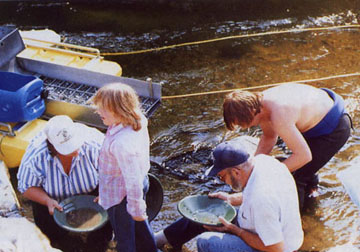BY ROBERT MILES
“Whenever I need some money, I tell my wife Karolyn that I’m going down to the bank to get some…the river bank that is. And so far, my belief that the gold is there, combined with hard work and good fortune, has never let me down.” … Jim Britton
Jim Britton’s the kind of man who will tell you right off that he’s doing exactly what he’s always dreamed of doing — that’s mining for gold. And even if he’s not pulling gold at the level he’d really like to at a particular point in time, he’s quick to say, “I’d rather be here beside the river enjoying the looking and anticipating the discovery than living in the city and breathing all that pollution and just working at some regular job.
“I was introduced to the Gold Bug at a very early age,” he says with a warm smile that turns quickly into a grin and makes one think that he may be about to spin a yarn. “Probably when I was six or seven years old. Back then, all us kids would watch adventure movies. I was hooked on the ones that had anything to do with gold. Then as I grew up I started reading about the old 49ers, and I just couldn’t seem to find out enough about where they mined and the methods they would use. Still it wasn’t till a few years later when I was out on my own with a shovel and a pan that I really got the ‘gold bite’. It was near a little town called Quartsville, just outside of Sweet Home, Oregon, where I actually found my first gold — about 1/2 pennyweight, and I’ve never been the same since.
“I’ve always believed you’ve got to do your homework, and that includes a lot of research. And in those days I had just began to discover all about underwater dredging, and I figured that since panning for gold was giving me such a kick, I would pull more gold and have a lot more fun if I had a dredge. So I went out and bought myself a two-inch suction dredge, and within no time at all I was pulling two to three pennyweight a day and just having a great time.
“That was really just the beginning,” recalled Jim, “because within a short time I had run into another guy who let me spend some time on his five-inch dredge. After a half an hour of pulling gold with it, I just couldn’t go back to working with my little two-inch. That’s when I had to get my entire family gold bitten,” he reflected. “My dad and mom had always been really supportive of the things I tried to do, but this time they just couldn’t believe that you could really just go out and find gold. Like most people, they figured all the gold was already found. However, within a short time I had them out there with me on the river bank, and by just getting them exposed to the gold I was bringing up with my two-inch, they were gold bitten real hard. Then within a short time, the entire family, including my older brother, was mining with our new five-inch, and we were pulling more gold than any of us had ever seen at one time.”
Like most successful gold miners, Jim Britton has tried working at a number of different jobs, but he says he just can’t get the river and the gold out of his mind. “It’s the thing I love to do,” he reports, “and besides, where could I ever get a job that pays as well as gold mining and has as much job security? There’s been gold miners since the dawn of recorded time, and there probably always will be. Some days I’ll make as much as $800 or even more, and I’ll do it in four hours. Of course, you gotta do your homework, and you gotta pay your dues.”
Jim’s formula for success still begins with a gold pan. “Before I put my dredge into a spot, I’ll pan up and down the bank, usually on both sides of the river looking for the point where the river’s deposited the most color during high water. I’ll have picked a particular stretch to check out, either because my knowledge and experience of how the gold is carried and pay-streaks are formed tells me that here should be good, or because someone else had been working there and either couldn’t locate the pay-streak, or had wandered off the mark and had decided to move on to a different area. By using my gold pan, I can usually get a good idea of where the river is ‘willing to payoff’ or at least where the pay dirt has hit the bank, and there’s where I’ll put my dredge in. I’ll first punch my hole and pay very close attention to the different pay layers. A lot of times I’ll find that the gold is lying four to five feet above the bedrock, and if I’d continue on down I’d just be wasting a lot of time and energy. Other times the bedrock’s where it’s gonna be, so I just have to keep on punching down till I hit bottom, and then I’ll begin a cut straight across the river channel.”
Jim has worked a lot of different areas of the Pacific Northwest, basically following up the different strikes of the old 49ers. He says he’s hit most of the hot spots in eastern and southern Oregon as well as spots in Idaho and California. Right now he’s mining the Klamath River in northern California, using a customized six-inch with a Keene power train and sluice box that is mounted on an R & R Mining frame and float bag kit.
“When I first saw the Klamath it looked mighty big, but within three days from the time I launched my 5-inch, I was into the gold and had enough money to cover my expenses and meet the bills for the next couple of months. I’ve dived this river for two years on a commercial basis, even in the winter when the dredge was white with a layer of ground frost, and the water temperature was probably 45°. Last summer in just three weeks I pulled one and a half pounds of gold in an area we call Glory Hole.”
Jim is also quick to point out that while mining is right for him, it may not be right for everyone. A person’s got to work really hard and be mentally and financially able to stand the dry spells. “I’ve been able to make it work because I’ve got the full support of my wife Karolyn and our two daughters. Karolyn, who lives and works in Vancouver, Washington, makes the long trip up to the Klamath every two weeks, spending the weekend helping to tend the dredge, enjoying the beauty of the great outdoors, and picking nuggets out of the sluice box. My folks have also been behind us a hundred percent, spending ,time at the river as well.”
Everett Gene Britton, Jim’s father, who helped finance that first 5-inch dredge, remained an avid gold miner until his death early this spring, stating in no uncertain terms that some of his very best days were spent panning gold and tending dredge.
In the local area surrounding the Klamath, Jim Britton is known as a man who will lend a helping hand. The kind of person who will take time out of his own diving schedule to get a neophyte gold miner off to a little better start. And he’s an advocate of “miners helping miners” and the necessity of miners working and standing together to protect their rights as granted under the 1872 Mining Law.
“My life is gold,” he reports. “In fact whenever I’m back home and someone comes to visit, my wife will tell them not to mention gold, or I’ll never stop talking about it. I’ve even tried to stay away from the river and the dredge, but it’s in my blood, and I get withdrawal pains whenever I’m away from it. My life is like living an adventure, and if someone would offer me a job at say a $100,000 a year, I would just have to pass it up, because finding gold is what I love and it’s what I’m good at.”






